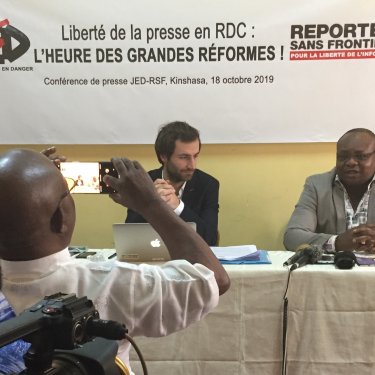Time for major press freedom reforms in DRC

Reporters Without Borders (RSF) and Journalist in Danger (JED), its partner organization in the Democratic Republic of Congo, gave a joint press conference in Kinshasa today at which they called on the DRC’s new government to prioritize two major reforms in order to keep its promise to improve press freedom.
The press conference concluded a five-day country visit by RSF aimed at making government officials and legislators aware of the need for swift press freedom reforms. During this visit, RSF and JED met with the communication and media minister, the human rights minister, the prime minister’s chief of staff and ten parliamentarians.
In his inaugural address in January, President Félix Tshisekedi said he wanted to turn the media into a “real fourth estate” and, on World Press Freedom Day (3 May), he was handed a list of 18 recommendations on how to achieve this.
“Reform of the 1996 press law, under which many press offences are punishable by imprisonment, and the creation of a special mechanism for protecting journalists are the two priorities that must be addressed without delay,” JED secretary-general Tshivis Tshivuadi said. “Despite a slight fall in press freedom violations since Félix Tshisekedi became president at the start of 2019, the level of violence continues to be worrying. The speeches have been encouraging but we are still waiting for the reforms.”
JED has registered 79 press freedom violations since the start of the year, including 15 arrests and 13 cases of aggression. As RSF and JED reported ten days ago, they include the beating that Dominique Dinanga, a journalist with one of Kinshasa’s most popular radio stations, Top Congo FM, received at a political rally on 5 October. Although identified, his attackers have not been arrested or questioned.
Pro-press freedom parliamentarians
At today’s press conference, RSF and JED announced that they have asked the authorities to establish a network of focal points in the various government agencies and ministries concerned with press freedom as a first step in the creation of a mechanism designed to ensure a rapid response to violations and a follow-up at the highest level, to establish a channel of communication with press freedom groups, and to step up protection for journalists and combat impunity.
As new, more protective legislation is the only way to ensure journalists’ safety in the long term, eight of the deputies and senators that JED and RSF met this week agreed to participate in a “club of pro-press freedom parliamentarians” formed by JED and RSF.
“To be able overhaul legislation and realize the historic reforms awaited for more than 20 years, it is essential not only for there to be a strong political will on the part of the government but also for legislators in both chambers to be very actively involved,” said Arnaud Froger, the head of RSF’s Africa desk. “These parliamentarians, who are known for their support for press freedom, will act as advocates for legislative reform and will help to establish more protective and more modern legislation. These reforms must be regarded as a priority.”
Ranked 154th out of 180 countries in RSF’s 2019 World Press Freedom Index, the DRC was the sub-Saharan country where RSF registered the most abuses against journalists in 2018.



